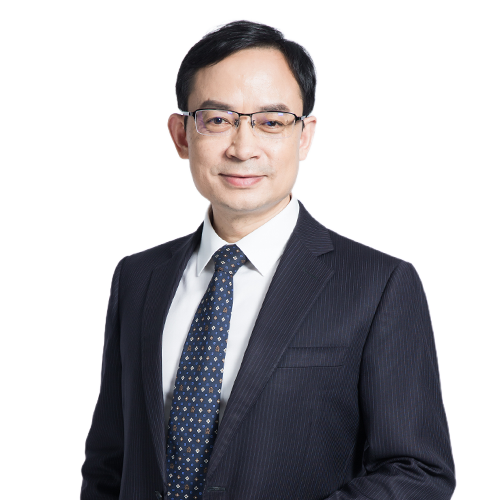On the morning of September 24, the Third Criminal Defense Summit Forum of Northwestern University of Political Science and Law (NWUPL), a series of activities for the 85th anniversary of NWUPL, was opened in Shaanxi Hotel. All-China Lawyers Association Criminal Defense Committee consultant, honorary director of King&Capital Law Firm, Northwest University of Political Science and Law, honorary director of the Institute of Criminal Defense, Tian Wenchang, associate professor of the Chinese Academy of Social Sciences University, Ky&Capital Law Firm part-time attorney Men Jinling, Director of King&Capital Law Firm, Zhu Yonghui, senior partner of King&Capital Law Firm, Director of the Kyoto Research Center of Criminal Defense Liang Yali, partner of King&Capital Law Firm Wang Xinlong, and Fu Qingtao of King&Capital Law Firm attended the conference and delivered keynote speeches.


Fan Jiu Li, Deputy Secretary of the Party Committee and President of Northwest University of Political Science and Law, delivered a welcome speech.
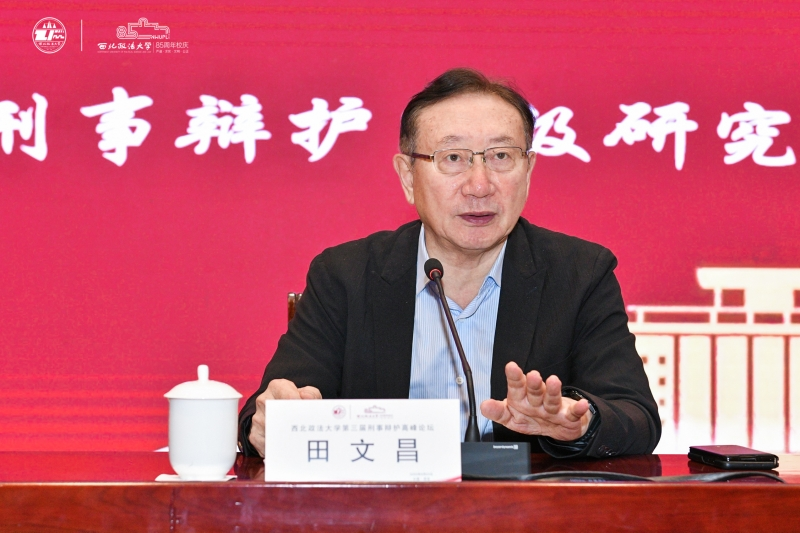
Tian Wenchang, Advisor of Criminal Defense Committee of All-China Lawyers' Association, Honorary Director of King&Capital Law Firm and Honorary Director of Advanced Institute of Criminal Defense of Northwestern University of Political Science and Law, delivered an opening speech.
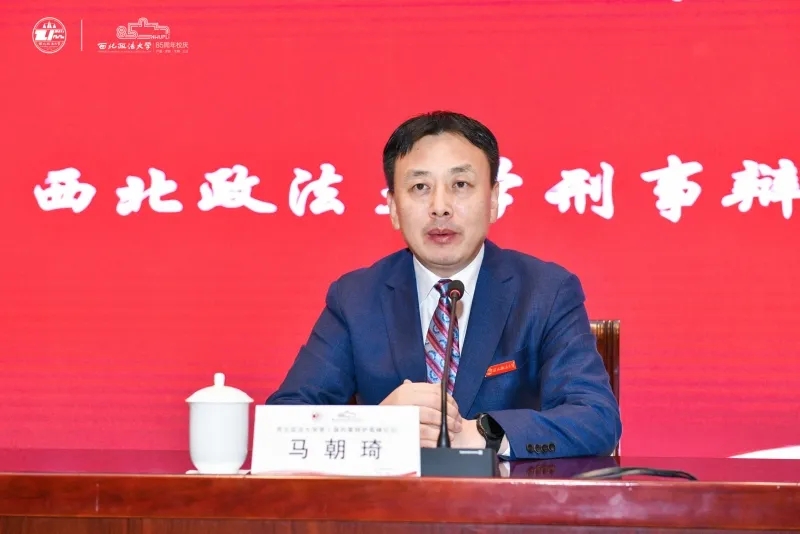
The opening ceremony of the forum was presided over by Ma Chaoqi, Vice President of Northwest University of Political Science and Law.
Wang Zhenghun, Vice President of China Criminal Law Research Society and Professor of Northwest University of Political Science and Law, Wang Gongxin, Chairman of the Board of Directors of Northwest University of Political Science and Law Advanced Research Institute of Criminal Defense, and Yao Ziqi, Vice President of Shaanxi Provincial Lawyers' Association attended the meeting.
The forum is divided into four units, respectively on "the procedure and evidence of unit crime", "the scope and identification of criminal cases involving property", "proof of criminal cases involving property", "the scope and identification of criminal cases involving property", "the scope and identification of criminal cases involving property", and "the scope and identification of criminal cases involving property". and "Disposal of property involved in criminal cases".
Unit 1: Procedures and Evidence of Unit Crimes
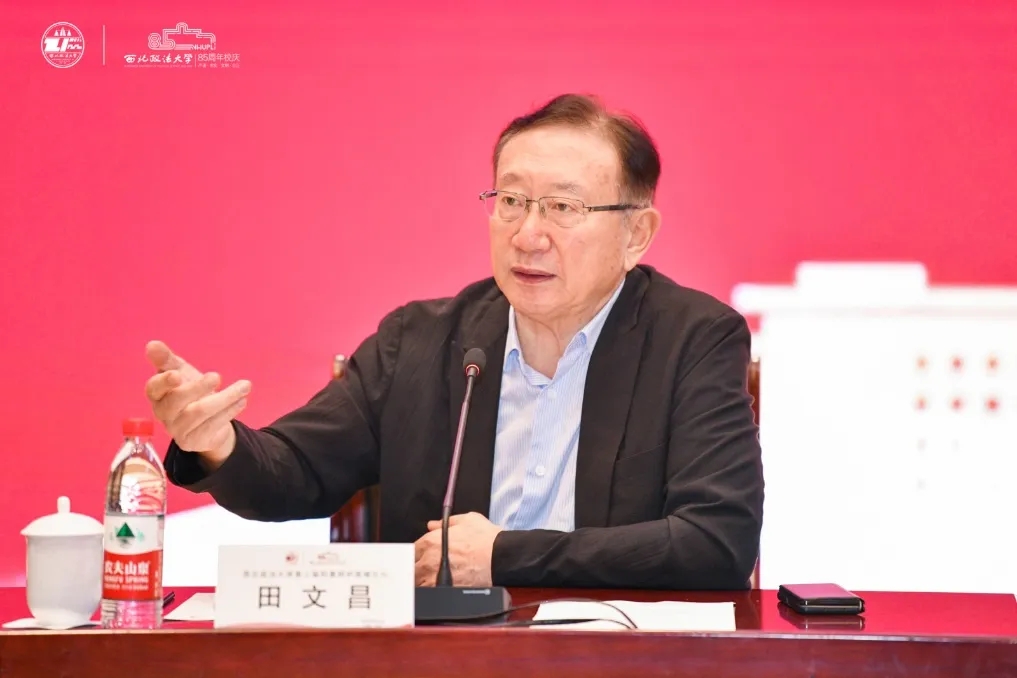
With regard to unit crime, Mr. Tian Wenchang put forward some issues worthy of attention and research from the following aspects. First, the concept of unit crime appeared late in our country, which is a supplementary crime established in 1997 criminal law. Second, the unit crime is actually the international community prevails the legal person crime, in our country is called unit crime, precisely because of the controversy, even after the subsequent provisions of the legal person crime still use the concept of unit crime, did not apply the international community prevails the concept of the legal person crime. Thirdly, the deeper reason for the controversy over unit crimes is the different economic nature. After the reform and opening up, China from the planned economy to the market economy, the two economic systems have long coexisted. Under the planned economy, the property of enterprises and institutions is owned by the state, and penalizing the unit means penalizing the owner itself, so there is no concept of unit crime. Fourthly, with the deepening of economic reform and the development of the private economy, the phenomenon of unit crime has become more and more frequent, so the need to penalize unit crime has become more and more prominent. Fifthly, although the law has clear provisions on unit crimes, there is still great difficulty in delineating the boundaries between unit crimes and crimes committed by natural persons, and this problem has not been completely solved until today. Finally, it can be seen from the existing legislation that there is a difference in sentencing intensity between unit crimes and crimes committed by natural persons. For some crimes, such as active bribery, the maximum penalty for natural persons is life imprisonment, while the maximum penalty for active bribery is only five years. This also leads to the blurring of the boundaries between unit crimes and natural person crimes in judicial practice, which is therefore more controversial and brings many difficulties to judicial activities, but also gives lawyers more space for defense.
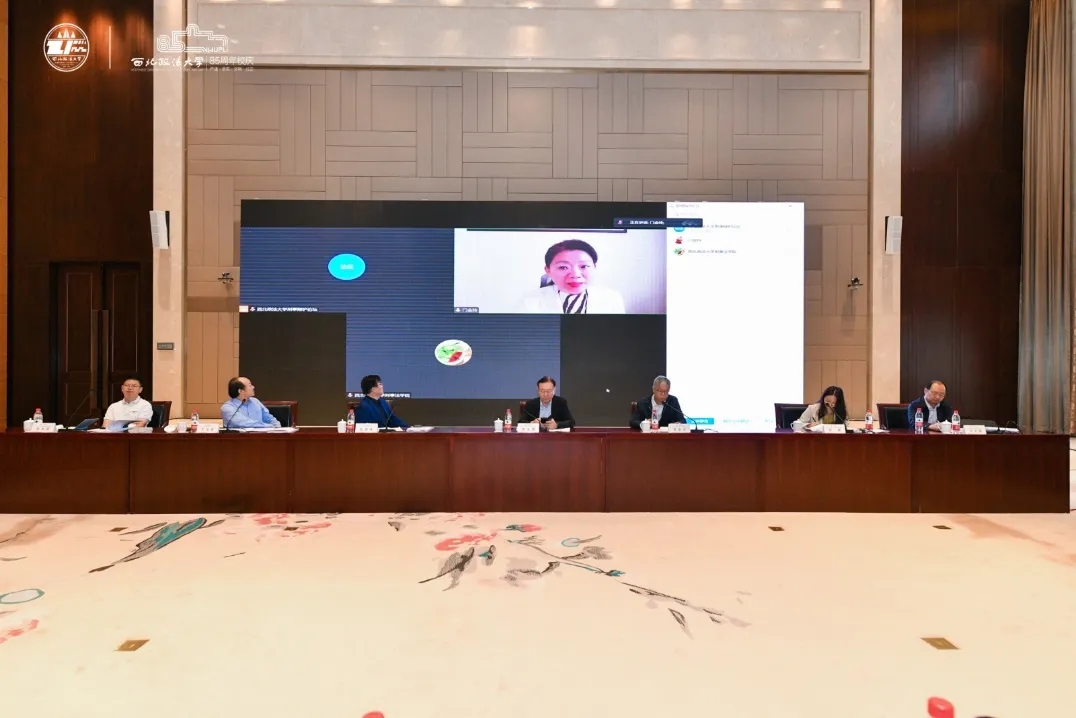
Door Jinling teacher for the "unit crime" of the procedure and evidence, to bribery and unit bribery as an example, a total of three aspects of the problem: First, China's "unit crime" entity without the status quo of the procedure; the Criminal Procedure Law of the unit crime procedure The Criminal Procedure Law is silent on the procedure for unit crimes. Secondly, Article 340 of the Judicial Interpretation of the Criminal Procedure Law of 2021 stipulates that if the procuratorate does not accept the judicial advice and insists on prosecuting a natural person, the court is allowed to change the subject of the crime prosecuted and apply the provisions of the unitary crime to adjudicate the case, which is contrary to the suspicion of "no prosecution, no reason". Thirdly, it is recommended that article 340 of the Judicial Interpretation should be interpreted in a restrictive manner, applying only to impure unit crimes in which the natural person and the unit commit the same crime with the same constituent elements. For pure unit crimes, such as unit bribery, and active bribery have different elements, the procuratorate does not accept the judicial advice to insist on prosecuting the natural person crime, the people's court shall be acquitted according to law. Finally, Ms. Men Jinling ended the keynote speech with "no procedure can not rule".
Unit 2: Scope and Recognition of Properties in Criminal Cases
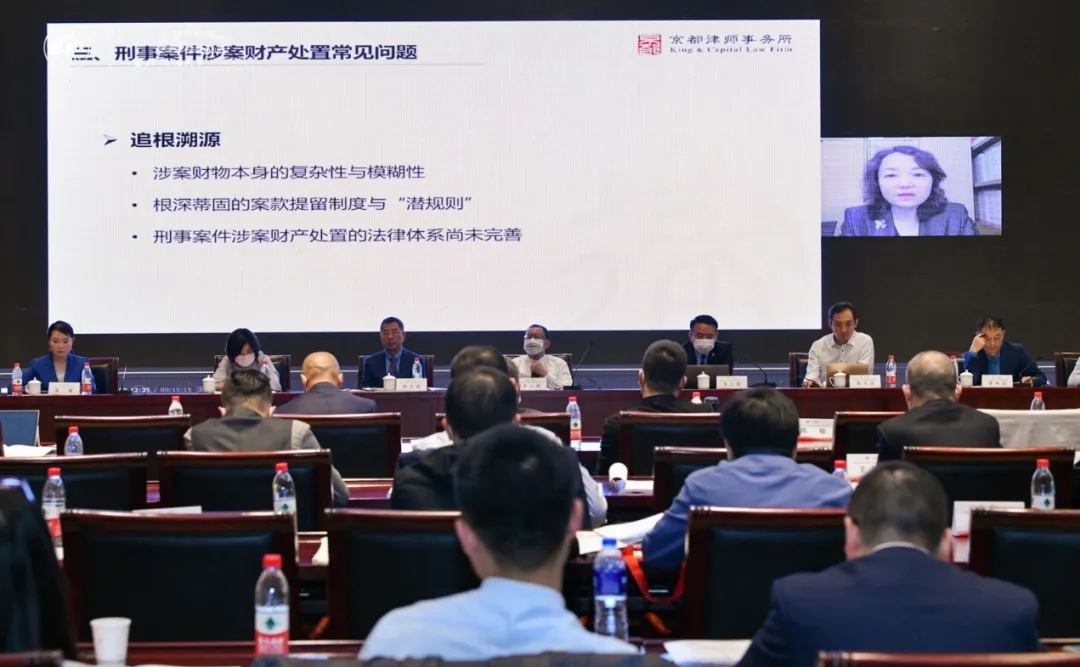
Ms. Liang Yali gave a keynote speech on the topic of "The Defense of Property Involved in Criminal Cases: Reflections on the Cases Involving Private Enterprises". In traditional criminal proceedings, the concepts of "valuing freedom over property" and "valuing people over things" are prevalent. Both sides emphasize the fairness of conviction and sentence, while neglecting the legality of property disposal. All along, the defense of property in criminal cases has not been paid attention to, but with the increasing number of anti-corruption cases, crowd cases, black cases, and along with the changes in the litigation procedures such as the system of leniency in plea bargaining and the reform of the corporate criminal compliance system, the disposition of property has gradually been the case of the parties involved in the case, the judiciary, and even the community's attention, and the defense of property has gradually become a relatively independent and professional field. The defense of case-related property has gradually become a relatively independent and professional field. However, at the same time, the disposition of property involved in the specific operation of the various stages of the current lack of uniform institutional constraints, and judicial practice generally exists on the norms of the lack of interpretation or even misinterpretation of the situation. From the point of view of defense experience, the defense of property involved in criminal cases, the key is that it should be synchronized with the litigation stage. First of all, make full use of the reform dividend of criminal compliance, private enterprise and property rights protection policy; secondly, to the judicial organs to distinguish between family property and personal property, for the parties to support family members to retain the necessary living expenses of a reasonable program; then, with the case authorities in the process of communication of the property involved in the opinion of the step by step, for the subsequent return of property or objections to provide support; lastly, as early as possible, collect and retrieve the relevant property Finally, collect and retrieve relevant property vouchers as early as possible to provide sufficient basis for the property defense program.
Unit 3 Proof of Property in Criminal Cases
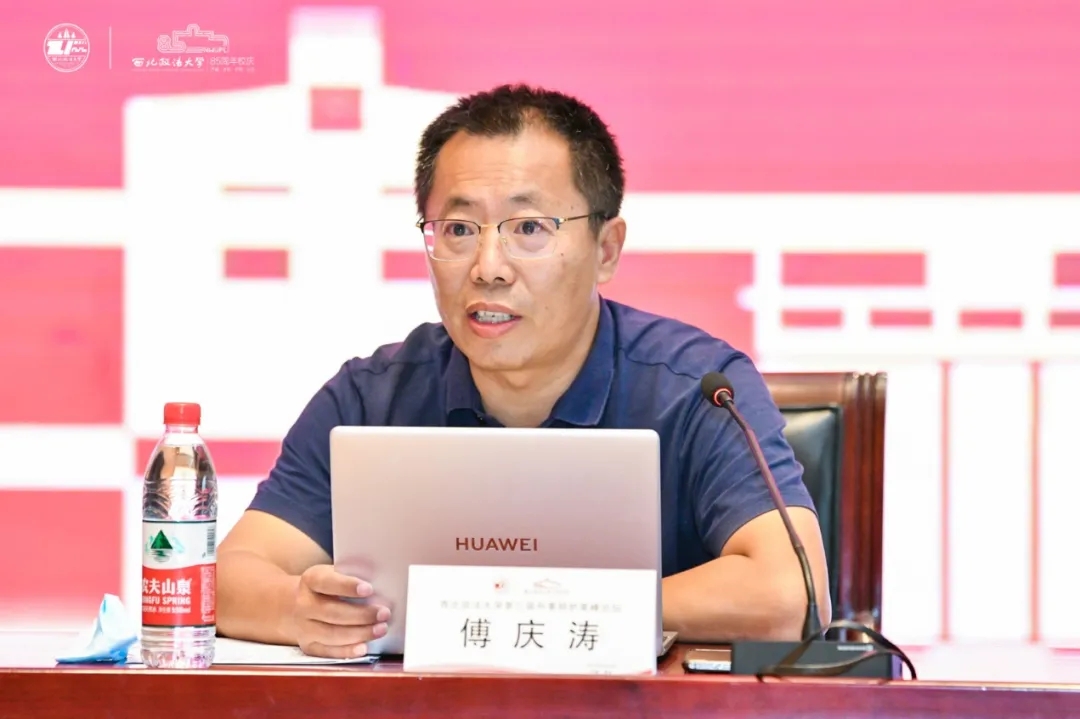
Mr. Fu Qingtao shares his views on the protection of property of outsiders. The outsider objected to the disposition of the property involved in the case, and the court executive board and the criminal trial court agreed that the outsider's claim was justified and should be resolved in accordance with the provisions of the bona fide acquisition, but how to resolve it has become a problem, and the relevant relief procedures are in a dilemma. First, with regard to the shortcomings of the existing provisions on the handling of substantive claims by outsiders, he pointed out that, on the one hand, it was not possible to "revoke or correct" an effective criminal judgment by reviewing and reconsidering an enforcement objection in a civil case, or by reviewing an enforcement decision. On the other hand, criminal corrective rulings and trial supervision procedures are not allowed to be applied arbitrarily. Secondly, with regard to the ideal premise that the current provisions are based on the investigation of property in criminal trials, he said that in order to resolve the legal dilemma described in the case, it is necessary to reiterate the nature of the investigation of the property involved in the case from the source. Property investigation is an important element of criminal investigation and an important part of criminal trial investigation. Property investigation and the handling of property involved in a case are essentially the determination and treatment of the nature of property, which can only be exercised by the right to trial. Finally, for the solution of the problem, he said that the supplementary investigation means of criminal trial can be introduced to carry out procedural reconstruction, and suggested that the procedure for handling objections of outsiders be reconstructed. Within the framework of the current objection handling system, the division of labor and cooperation mechanism of trial supplemental investigation, implementation of the ruling made, objection review and handling is constructed.
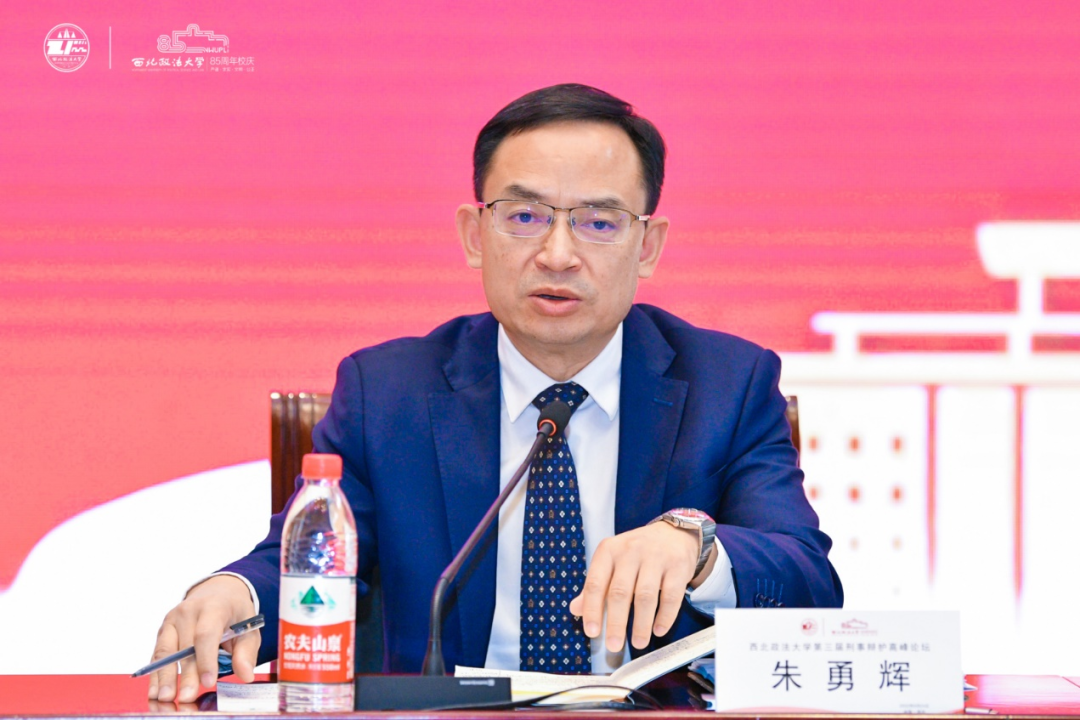
Director Zhu Yonghui proposed that the "principle of presumption of legality" of citizens' (units') property should be clarified through legislation, i.e., no property shall be deemed illegal without a judgment of the people's court in accordance with the law; the power of determining the illegality of property shall be uniquely and uniformly exercised by the people's court; the people's court shall strengthen the substantive hearing of whether the property is illegal or not; the prosecutor shall bear the full burden of proof in determining the illegality of property; and The prosecution bears the entire burden of proof in determining the illegality of property; the standard of proof for determining the illegality of property should be the same as that for determining the commission of a crime, i.e., the evidence is sufficient and beyond reasonable doubt. In addition, Zhu Yonghui also suggested that the people's court criminal trial court when encountering specialized civil issues can be "outsourced" to the civil court in accordance with the civil procedure for separate trial, and hope that the people's court in the criminal verdict to strengthen the property involved in the case is illegal to reasoning interpretation of the law.
Unit IV Disposal of property involved in criminal cases
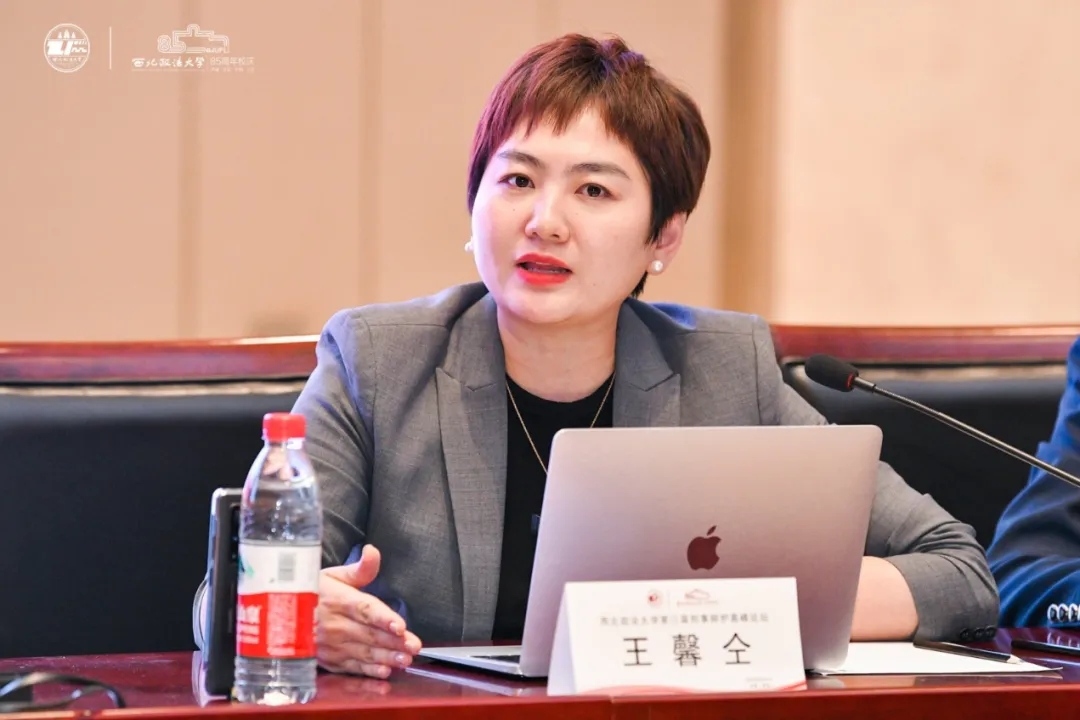
Mr. Wang Xintong shared his views on the topic of "the practice of outsider's objection to criminal property". In judicial practice, there are problems of excessive law enforcement and freezing of property involved in criminal cases, the root cause of which lies in the expansion of the concept of property involved in criminal cases, and some legal provisions overemphasize the "evidential value" of property involved in criminal cases, which may violate the legal rights and interests of outsiders in the process of disposing of property involved in criminal cases. According to the current legal system, the outsiders in the pre-trial, trial, and criminal property execution stage can object to the property involved in the case, but in the pre-trial stage and proved to be seized, frozen, seized property has nothing to do with the case is the most optimal choice, the outsiders and their attorneys should be actively respond to the property involved in the case of disputes over the ownership of the property with justification, and strive to solve the problem as soon as possible. In order to protect the rights of lawyers at the pre-trial stage, a public mechanism and notification system for the disposal of property involved in the case should be established, and a special file transfer system for property involved in the case should be set up by the investigating authorities, as well as clarifying the rights of the representatives of the outsiders in the case.
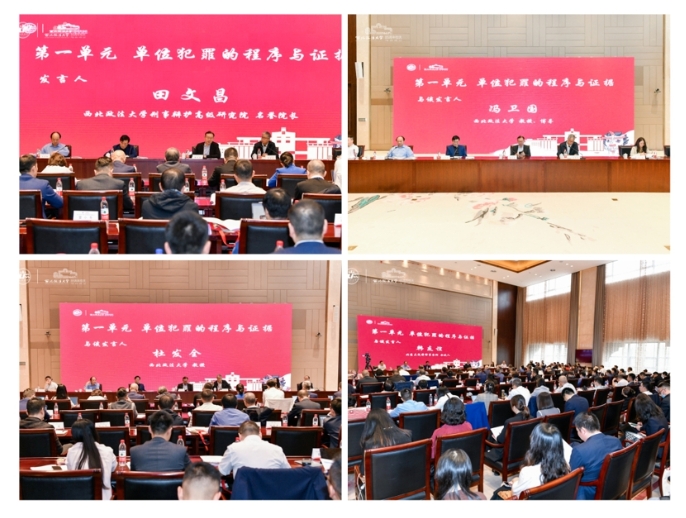
Teachers and students from universities and research institutes, judicial practice, and Northwestern University of Political Science and Law attended the forum. The number of online viewers exceeded 25,000 people. The forum lasted for one day, and the participants talked warmly, theories were closely linked to practice, and they fully expressed their opinions on theoretical and practical issues, which effectively promoted the development of criminal defense research.
Institute of Criminal Defense, Northwestern University of Political Science and Law
Since July 2017, the Institute of Advanced Studies in Criminal Defense of Northwestern University of Political Science and Law has been committed to defense theory research, promotion of criminal defense culture, accompaniment of criminal defense talents, and training of criminal defense lawyers. The Criminal Defense Summit Forum is a high-level, high-level series of forums sponsored by the Institute of Advanced Studies in Criminal Defense of Northwestern University of Political Science and Law under the support of Northwestern University of Political Science and Law, which has been successfully held for two sessions.
King&Capital Law Firm
King&Capital Law Firm, founded in 1995, is one of the early partnership law firms in China. At present, King&Capital Law Firm has been built into a comprehensive law firm providing a full range of legal services including non-litigation business, civil and commercial litigation, and criminal litigation. In addition to its head office in Beijing CBD (Central Business District), the firm also has branches in Shanghai, Shenzhen, Dalian, Tianjin, Nanjing, Haikou, Zhengzhou, Chongqing, Yokohama, Japan, etc. It has more than 600 lawyers, hundreds of elite lawyers and the most authoritative expert consultants in China's legal field, and has established a professional, team-oriented, and professional legal team, and has maintained a long-term cooperative relationship and academic exchanges with a number of relevant domestic and foreign governmental agencies, professional organizations and law firms. We have established a large-scale comprehensive legal service platform that is specialized, team-oriented and internationalized.





